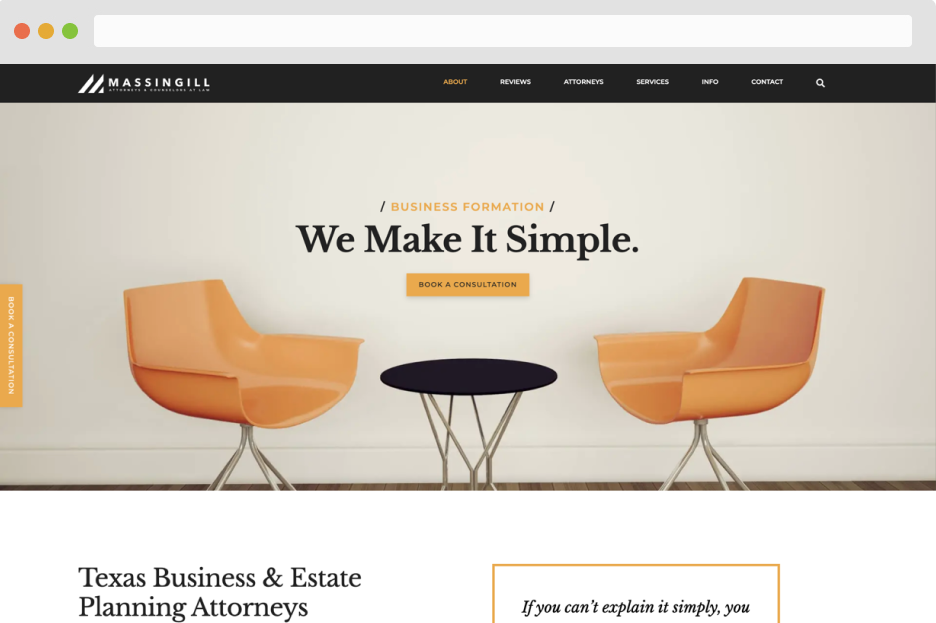A high-quality law firm website is not just a digital business card, but an investment that generates a strong ROI by either:
- Generating leads from your ideal clients
- Building credibility for your ideal clients
- Differentiate you from your competition (help them decide to contact you above all others)
And ultimately it has to drive much more revenue to your firm than you put into it. While there are other goals for a website, these are the qualities of law firms website who generate substantial revenue directly attributable to their online presence.
A successful law firm website goes beyond aesthetics and showcases its expertise, credibility, and unique value proposition.
It provides a seamless user experience, offers valuable resources and content, and establishes trust with potential clients. By effectively leveraging its online presence, a law firm website becomes a powerful tool that maximizes profitability and fuels business growth.
But before we dive into the things that make a great law firm website, it’s important to have the right mindset when it comes to your web presence.

A Website is Not an Expense. It’s an Investment
Attorneys need to adopt a mindset that views a website not as an expense but as a strategic investment. Recognizing the potential of a well-designed and optimized website, attorneys should approach it as a valuable tool that can yield substantial returns.
Instead of considering website development and maintenance costs as a burden, attorneys should perceive them as an opportunity to generate leads, convert clients, and ultimately increase revenue.
This mindset shift allows attorneys to prioritize the quality, functionality, and marketing potential of their website, understanding that the investment made will pay off in terms of enhanced visibility, improved client acquisition, and a strong online presence.
After all, would you rather have a website that’s launched quickly that has you missing out on 50% of the best cases because you took shortcuts?
By embracing the perspective that a website is an investment, attorneys can approach its development and ongoing management with a long-term strategy in mind. They should focus on building a website that not only showcases their expertise and professionalism but also provides a seamless user experience and serves as a powerful marketing tool.
Allocating resources and effort into search engine optimization (SEO), compelling content creation, and regular updates ensures that the website continues to generate leads, engage potential clients, and contribute to the firm’s overall success.
With this investment mindset, attorneys can harness the full potential of their website to attract and convert clients, solidifying its role as a valuable asset that delivers significant returns on their initial investment.

Qualities of a Great Law Firm Website
Here are just some of the qualities we think make great websites. While design is subjective, a lot of these are not negotiable.
1. Uncluttered Design
An attorney’s website should embrace a minimalist design aesthetic that prioritizes user-friendly navigation. The interface should be clean and free of unnecessary elements that could distract visitors. Important features such as calls-to-action must be prominently highlighted, ensuring that users can find them without difficulty.
Action items include:
- Keep the website layout clean and modern.
- Minimize the use of heavy graphics that can cause distraction or slow page loading times.
- Highlight important elements like calls-to-action.
- Use consistent and easy-to-read fonts.
- Test the website navigation on different devices to ensure user-friendliness.
- Use easy to understand language to address your ideal clients pain points
2. Detailed Attorney Bios
Attorney bios are often among the most visited pages on a law firm’s website. Prospective clients want to know about the people they might be working with, making this a crucial aspect of the site. The profiles should be comprehensive, covering professional experiences and qualifications, but they should also incorporate some personal details to help build a connection with potential clients.
Action items include:
- Include detailed professional qualifications and experiences in attorney bios.
- Add personal details to help visitors connect on a more personal level.
- Regularly update the bio pages to reflect recent accomplishments or changes.
- Use professional photos to accompany the bios.
- Incorporate client testimonials or case results where relevant.
- Add awards and professional associations logos where applicable
3. Have Actionable Prompts
Calls-to-action (CTAs) are a vital component of a law firm’s website. These prompts help guide visitors towards desired actions, like contacting the firm or downloading a resource. Effective CTAs are clear, compelling, and conveniently placed throughout the website. They need to be super clear and very easy to understand.
Action items include:
- Include a variety of CTAs, such as phone numbers, live chat, forms, and downloadable resources.
- Make sure CTAs are clear, concise, and compelling.
- Position CTAs strategically throughout the website.
- Test different CTA designs and placements to determine what works best.
- Ensure CTAs stand out visually on the page.
4. Accessible Contact Details
Prospective clients need to be able to contact the firm easily. Every page of the website should include contact information, such as phone numbers, email addresses, and physical addresses.
This accessibility not only improves user experience but also helps to optimize the site for local search results.
Action items include:
- Display contact information prominently on every page of the website.
- Include multiple methods of contact (phone, email, contact form).
- Ensure contact information is accurate and consistent across the website.
- Consider including a map or directions for physical locations.
- Optimize contact information for local search results.
5. Relevant and Current Content
A successful attorney’s website should be regularly updated with fresh, relevant content. This content should be tailored to address the needs and concerns of its visitors, providing solutions or information about emerging areas of interest. Quality content not only helps to engage visitors but also boosts the site’s search engine ranking.
Action items include:
- Regularly update the website with fresh, relevant content.
- Tailor content to address the needs and concerns of visitors.
- Incorporate keywords naturally into the content for search engine optimization.
- Use a variety of content types, including blog posts, articles, videos, and infographics.
- Encourage user engagement with interactive content or comment sections.
6. Evidences of Social Acceptance
Social proof is a powerful tool in building trust with potential clients. Reviews, testimonials, and social media interactions can all contribute to the perception of the firm’s reliability and competence. Highlighting positive client experiences and social media engagement can significantly enhance the firm’s online reputation.
Action items include:
- Display client reviews and testimonials prominently on the website.
- Incorporate social media buttons to encourage sharing and following.
- Highlight media features or interviews. -Encourage satisfied clients to leave reviews or testimonials.
- Respond to reviews and social media interactions in a professional and timely manner.
7. Tailored to Audience Preferences
Understanding the needs and preferences of the target audience is crucial for a successful attorney’s website. The design, content, and features of the site should all be tailored to this audience. A clear understanding of the audience can guide the tone of writing, choice of features, and overall presentation of the website.
Action items include:
- Research and define the target audience for the website.
- Tailor the website design and content to this audience’s preferences.
- Test different design elements, content types, and features to see what resonates with the audience.
- Regularly review and update the website based on user feedback and behavior.
- Utilize analytics to gain a deeper understanding of the audience and their behavior on the site.
8. Usage Tracking
Tracking visitor behavior on the website is essential for ongoing optimization. Comprehensive tracking can reveal which pages users visit, how long they stay, and what actions they take. This data can guide improvements to the website’s navigation, content, and design, and can also help target the most promising prospective clients.
Action items include:
- Implement comprehensive visitor tracking on the website.
- Regularly review and analyze visitor data.
- Make necessary adjustments to the website based on this data.
- Utilize data to target prospective clients effectively.
- Consider using remarketing advertising based on visitor behavior.
9. Optimized for Mobile Use
With the growing number of people accessing the web from mobile devices, it’s crucial for an attorney’s website to be mobile-friendly. The site should provide a seamless browsing experience on any device, with content and design elements that adapt well to smaller screens. Being mobile-friendly enhances user experience and is also a significant factor in search engine rankings.
Action items include:
- Ensure the website is responsive, adjusting to fit any screen size.
- Test the website on various mobile devices to ensure a seamless user experience.
- Design content and navigation elements to work well on mobile.
- Prioritize load speed for mobile users.
- Keep up with the latest mobile web design trends and standards.
Are you looking to improve the ROI of your law firm website?
Are you eager to enhance the return on investment (ROI) of your law firm website? Look no further than Juris Digital, your trusted partner in optimizing online success.
Our experienced account strategists are ready to discuss how we can amplify your website’s performance and drive meaningful results. Check out our web design services and past examples here.
Don’t miss out on valuable insights! Sign up for our email newsletter today and receive expert tips and strategies delivered directly to your inbox. Take a proactive step towards maximizing your law firm’s online presence by contacting us and subscribing to our newsletter now.
Want to check out great law firm website designs? Check out this article.
